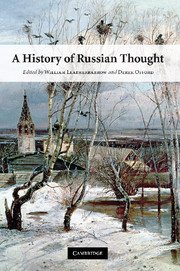Book contents
- Frontmatter
- Contents
- Preface
- List of contributors
- Dates, transliteration and other conventions
- Dates of reigns
- Russian titles of journals, newspapers and miscellanies
- PART I CONTEXT
- PART II INTELLECTUAL CURRENTS
- PART III THEMES AND CONSTRUCTS
- 9 The West
- 10 The East
- 11 The people
- 12 The intelligentsia and capitalism
- 13 Natural science
- PART IV THE AFTERLIFE OF CLASSICAL THOUGHT
- Biographical details of thinkers and writers
- Selected bibliography
- Index
9 - The West
Published online by Cambridge University Press: 05 June 2012
- Frontmatter
- Contents
- Preface
- List of contributors
- Dates, transliteration and other conventions
- Dates of reigns
- Russian titles of journals, newspapers and miscellanies
- PART I CONTEXT
- PART II INTELLECTUAL CURRENTS
- PART III THEMES AND CONSTRUCTS
- 9 The West
- 10 The East
- 11 The people
- 12 The intelligentsia and capitalism
- 13 Natural science
- PART IV THE AFTERLIFE OF CLASSICAL THOUGHT
- Biographical details of thinkers and writers
- Selected bibliography
- Index
Summary
Since Peter the Great's reforms ‘the West’ (zapad) had become arguably the most important ingredient of modern Russian identity. Through debating Russia's relationship to this constructed category, the Russian elites pictured Russia as a nation and as an empire, identified paths for their country's modernising political, economic and social reforms, analysed the place of the individual in society and dwelt on the role of religion in the modern world. In the period discussed in this chapter, the dichotomy between the West and the East (Orient) (vostok), or Europe and Asia, constituted an essential component of how all the European elites perceived their nations. These categories are, of course, not fixed, objective entities. They are cultural and political constructs ‘talked and written into existence’. The geographical boundaries of these categories have changed as a result of historical events and often have depended on the arguments those evoking them aimed to advance. While ‘the West’ and ‘Europe’ were sometimes identified as one and the same, on other occasions, as we will see in this chapter, ‘the West’ and true ‘Europe’ could be separated and contrasted. ‘Europe’ and ‘the West’ have never been purely geographical categories; rather, they are, above all, cultural and developmental (defined through common cultural, social and political traits and patterns of development), as well as temporal (as reflected, for instance, in the arguments that true European values were manifested in the past or would be realised in the future).
- Type
- Chapter
- Information
- A History of Russian Thought , pp. 197 - 216Publisher: Cambridge University PressPrint publication year: 2010
- 2
- Cited by



